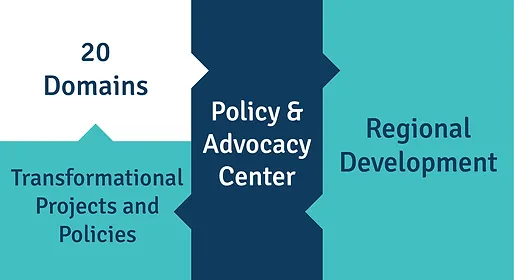The Policy & Advocacy Center
For Regional Development
MENA2050 members are experienced policymakers, strategists, businesspersons, scientists, media figures, civil society leaders, and entrepreneurs from multiple domains – who are very well-connected to governments, corporations, NGOs, and academic centers.
Our Policy & Advocacy Center with its partners will create policy proposals for regional development and propose and promote projects to
address regional challenges and opportunities on the following domains:

MENA2050 members are experienced policymakers, strategists, businesspersons, scientists, media figures, civil society leaders, and entrepreneurs from multiple domains – who are very well-connected to governments, corporations, NGOs, and academic centers.

- 1. Food Security and Supply Chain
- 2. Water Security
- 3. Education and Literacy
- 4. Green Energy, Energy
- 5. Skill and workforce training and employability
- 6. Innovation, Entrepreneurship, Brain Drain
- 7. Agro-Tech/Agriculture Modernization
- 8. Regional Economy Infrastructure
- 9. Healthcare and Medical Security
- 10. Transportation, Logistics, Supply Chain
- 11. Climate Change/Pollution, Environment, Tourism
- 12. IT, Technology, and Digital Economy
- 13. Tourism
- 14. Women's Empowerment
- 15. Social Security and Domestic Violence
- 16. Cultural Gaps, Interfaith Dialogue, Sports and Cultural Diplomacy
- 17. Trade Development
- 18. Media de-radicalization
- 19. Crime and Corruption (drugs, trafficking, etc.)
- 20. Regional Security
In addition to the transformational projects, the Center’s annual conference will focus on the domains, projects, and policies.
The Policy & Advocacy Center publishes our “Voice of MENA2050”, which reaches the top decision-makers and influencers in the region and beyond, to drive and monitor the implementation of our proposals.
We will sometimes drive our policies and project proposals as a concept. In some cases, we may also decide to take responsibility for a specific project and build a specially dedicated team around it, with dedicated budgets and “business-like” supervision.
